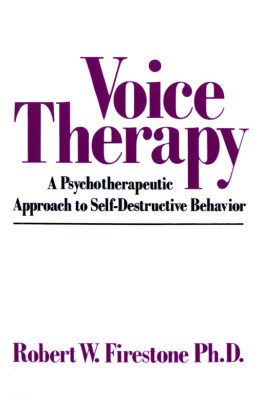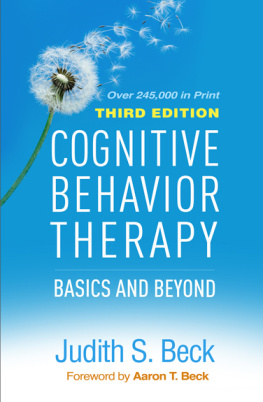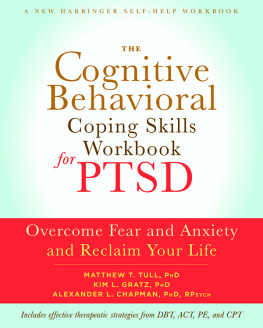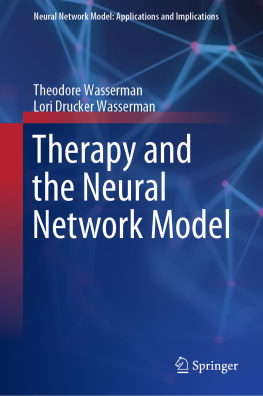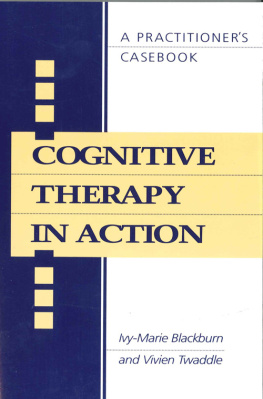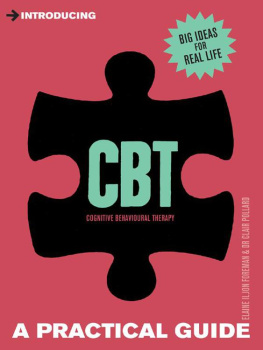
THE EVOLUTION OF COGNITIVE
BEHAVIOR THERAPY
The Evolution of Cognitive Behavior Therapy: A Personal and Professional Journey with Don Meichenbaum explores the untold story of how Cognitive Behavior Therapy emerged and discusses the controversies encountered along the way. This volume will feature a personal account of Don Meichenbaums contributions from his initial work on self-instructional training with schizophrenics and impulsive children, through his work on stress inoculation training, and his most recent works with traumatized individuals. These previously published papers are complemented with updated papers and accompanying commentary.
Donald Meichenbaum, PhD, is Distinguished Professor Emeritus, University of Waterloo, Ontario, Canada. He is currently Research Director of the Melissa Institute for Violence Prevention in Miami, Florida. He is one of the founders of Cognitive Behavior Therapy and was also voted one of the ten most influential psychotherapists of the twentieth century. He has also received a Lifetime Achievement Award from the Clinical Division of the American Psychological Association.
First published 2017
by Routledge
711 Third Avenue, New York, NY 10017
and by Routledge
2 Park Square, Milton Park, Abingdon, Oxon, OX14 4RN
Routledge is an imprint of the Taylor & Francis Group, an informa business.
2017 Taylor & Francis
The right of Donald Meichenbaum to be identified as author of this work has been asserted by him in accordance with sections 77 and 78 of the Copyright, Designs and Patents Act 1988.
All rights reserved. No part of this book may be reprinted or reproduced or utilised in any form or by any electronic, mechanical, or other means, now known or hereafter invented, including photocopying and recording, or in any information storage or retrieval system, without permission in writing from the publishers.
Trademark notice: Product or corporate names may be trademarks or registered trademarks, and are used only for identification and explanation without intent to infringe.
Library of Congress Cataloging in Publication Data
A catalog entry for this book has been requested.
ISBN: 978-1-138-81221-5 (hbk)
ISBN: 978-1-138-81222-2 (pbk)
ISBN: 978-1-315-74893-1 (ebk)
Typeset in Bembo
by Cenveo Publisher Services
Visit the eResources: https://www.routledge.com/9781138812222
This book is dedicated to my beloved wife, Marianne, who has supported and encouraged me throughout this entire journey. I also want to express a heartfelt appreciation to my graduate students and colleagues at the University of Waterloo, Ontario, Canada, who helped make my professional career so rewarding.
CONTENTS
PART I
Origins: Stories of a Personal and Professional Journey
Donald Meichenbaum
Donald Meichenbaum
PART II
The Development and Implementation of Self-Instructional Training
Donald Meichenbaum and Roy Cameron
Donald Meichenbaum and Joseph Goodman
Donald Meichenbaum
Andrew Biemiller and Donald Meichenbaum
PART III
The Development and Application of Stress Inoculation Training
Donald Meichenbaum
Donald Meichenbaum
Dennis C. Turk and Donald Meichenbaum
PART IV
Trauma, Resilience and Recovery
Donald Meichenbaum
Donald Meichenbaum
PART V
Core Tasks of Psychotherapy: What Expert Therapists Do
Donald Meichenbaum
Donald Meichenbaum
PART VI
Working with Suicidal Patients: Lessons Learned
Donald Meichenbaum
Donald Meichenbaum
PART VII
A Look to the Future
Donald Meichenbaum
Human beings are story tellers. It is human nature to make meaning of our lives by organizing what happens to us into stories. We are immersed in our stories.
(Stephen Joseph, 2011, p. 43)
Like our clients, we are each not only homo sapiens, but also homo narrans, or story tellers. As psychotherapists, we get paid to listen to our clients stories and we help them develop healing stories, and the accompanying coping skills in order to conduct a more adaptive, self-fulfilling life.
This book is an invitation to tell my story of the development and evolution of Cognitive Behavior Therapy from both a personal and professional perspective. The book addresses the following three questions:
How did I develop from being an undergraduate psychology major at City College of New York to being voted by clinicians to be one of the ten most influential psychotherapists of the 20th century? (Smith, 1982).
How did the field of Behavior Therapy that initially eschewed the concept of cognition as not having any explanatory value evolve into the Association for Behavioral and Cognitive Therapies?
How has the conceptualization of the concept of cognition changed in the field of psychotherapy and what are the implications for the ways in which interventions are implemented?
In order to answer these three challenging questions, I have been invited to select articles I have written over the course of 45 years of clinical research and practice. I am presently 75 years old and I have entered into what Erik Erikson called the Generativity phase of life giving science away and sharing any lessons that I have learned in seeing clients over all of these years.
In each part of this book, I have included references to updated, more recent papers that the interested reader can access. Some 20 years ago, I retired as Distinguished Professor Emeritus from the University of Waterloo in Ontario, Canada to become the Research Director of the Melissa Institute for Violence Prevention and Treatment, in Miami, Florida (see www.melissainstitute.org). In fact, the Melissa Institutes websites have had over two million hits worldwide this year. If you visit the Homepage and click Resources, and then click on Author Index, you can then scroll down to Meichenbaum and open the additional articles that I refer to in this book.
Sometimes, when a scientist dies his/her students put together a collection of writings in honor of the scholar, or what is called a Festschrift. Since I am not confident that my students would undertake such a venture, I decided to create a Festschrift to myself.
Thank you for joining me on my journey, but the journey actually continues. I have included a series of follow-up articles that you, the reader can access by visiting: https://www.routledge.com/9781138812222.
References
Joseph, S. (2011). What Does Not Kill Us: The New Psychology of Posttraumatic Growth. New York: Basic Books.
Smith, D. (1982). Trends in counselling and psychotherapy. American Psychologist, 37: 8029.
As mentioned, I have included a number of follow-up articles that provide an update on my work in the last decade. Throughout this book, I indicate where you, the reader, may wish to access the follow-up articles of interest listed below by visiting the web address given on page xii. Your feedback will be welcomed. You can email me at:
Ways to Implement Interventions in Schools in Order to Make Them Safer, More Inviting and Pedagogically More Effective.
School and Community-Based Preventative Approaches: Top Down and Bottom-Up Interventions. (See also the Melissa Institute website: www.teachsafeschools.org.)
Guidelines for Improving Generalization.
The Emerging Neurobiology of Resilience: Implications for Psychotherapeutic Interventions.


